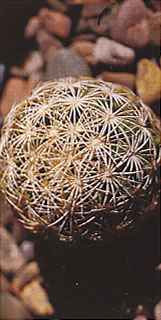|
C. compacta is believed to be the Tarahumara híkuri known as "bakánawa." Bakánawa, like most híkuri, is both respected and feared as a god, and considered to have a soul and human emotions. It has been recorded as both more powerful, and as only second in power, to L. williamsii. To some populations of Tarahumara, particularly those of Guadalupe, it is (was) their primary híkuri, being valued instead of L. williamsii.
It is held that if one keeps bakánawa in their possession exceeding three years it will convert from a good medicine to an evil one that causes insanity, therefore one must sell it or hide it after the third year. Of interest are speculations by Thord-Gray that this belief may have originated through a shaman so "that he might sell more of the plant." It is also believed that by either losing or burning this cactus one can become insane, sick, or even die. In some cases it is considered so "strong" that it can only be touched by the shaman.
C. compacta is a powerful medicinal panacea and is masticated and applied to the body to cure all imaginable ills. It is boiled for use as an internal medicine and the juice is applied externally for lung troubles. A chewed ointment of C. compacta is rubbed on the legs of foot-runners for three days prior to the traditional races and is kept in waiting by the shaman should the runner tire. The plant may also be carried in the runners' belts to make them swift and fearless and to frustrate the evil spells cast by their opponents. It is believed that the runner who offends bakánawa will slow in speed and eventually die.
Many Coryphantha species bear an array of alkaloids, and even though only this one species is substantiated as híkuri, it can be suspected that others also have had sacramental and medicinal value. Anderson regards C. compacta and C. palmeri as synonymous.
|
